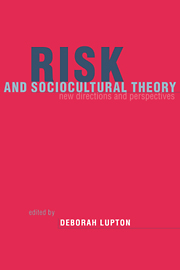Book contents
- Frontmatter
- Contents
- List of contributors
- Introduction: risk and sociocultural theory
- 1 Postmodern reflections on ‘risk’, ‘hazards’ and life choices
- 2 Fear of crime and the media: sociocultural theories of risk
- 3 Risk and the ontology of pregnant embodiment
- 4 Risk anxiety and the social construction of childhood
- 5 Constructing an endangered nation: risk, race and rationality in Australia's native title debate
- 6 Risk, calculable and incalculable
- 7 Ordering risks
- Index
2 - Fear of crime and the media: sociocultural theories of risk
Published online by Cambridge University Press: 16 September 2009
- Frontmatter
- Contents
- List of contributors
- Introduction: risk and sociocultural theory
- 1 Postmodern reflections on ‘risk’, ‘hazards’ and life choices
- 2 Fear of crime and the media: sociocultural theories of risk
- 3 Risk and the ontology of pregnant embodiment
- 4 Risk anxiety and the social construction of childhood
- 5 Constructing an endangered nation: risk, race and rationality in Australia's native title debate
- 6 Risk, calculable and incalculable
- 7 Ordering risks
- Index
Summary
Fear of crime has received a huge literature (for recent surveys, see Hale, 1996; Tulloch et al., 1998a), much of the work in the media area circulating around Gerbner's ‘cultivation thesis’ (Gerbner, 1970, Gerbner and Gross, 1976, Gerbner et al., 1978; Gerbner et al., 1980). Researchers' ongoing preoccupation with Gerbner and associates (hereafter ‘Gerbner’) is not surprising, given, as Hale notes, that one major tendency in fear of crime discourse has been the positioning of fear of crime ‘as having no grounding in reality but being merely the product of sensational and selective news coverage and lurid dramatisation’ (Hale, 1996: 109).
Gerbner's work took its general position theoretically and politically among the hegemonic analyses of the media and late modernity during the 1970s, one of the many ‘social control’ approaches to the role of the media and society that marked that period. In particular it extended the ‘TV violence’ debate within a ‘power and ideology’ framework, challenging both the linear ‘effects’ model of American communication theory (which was much exercised by that debate), and the somewhat individualized ‘normative’ frame it was directed at. Whereas debate about television violence had been based on the assumption that its effects were likely to be anti-normative and thus disruptive, Gerbner began from the ‘critical theory’ view of the media as vehicles of the established sociocultural and industrial order.
- Type
- Chapter
- Information
- Risk and Sociocultural TheoryNew Directions and Perspectives, pp. 34 - 58Publisher: Cambridge University PressPrint publication year: 1999
- 11
- Cited by



